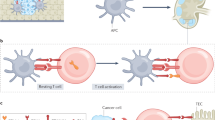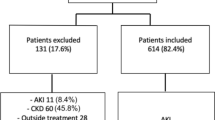Abstract
Background
Immunotherapy with immune checkpoint inhibitors (ICPi) may cause acute kidney injury (AKI) and their use is increasing.
Materials and methods
This is a single-center retrospective cohort study of patients receiving ICPi drugs for solid organ malignancies. ICPi-related AKI, the need for renal replacement therapy during or following ICPi treatment, and the associated mortality was studied.
Results
Two hundred thirty five patients were included in the final analysis. Patients with (N = 40) and without (n = 195) AKI had similar age, sex, type of ICPi, baseline serum creatinine levels, comorbidities and mortality; while patients with AKI were more likely to be receiving a nephrotoxic agent or be treated for genitourinary malignancy. 18 patients had ICPi-related AKI; 7 of these patients underwent kidney biopsy, which showed acute interstitial nephritis while the remaining 11 were diagnosed on clinical parameters. 18 (45%) patients recovered kidney function after AKI. No differences were observed between patients with and without kidney function recovery, although patients without recovery had a numerical, but not statistically significant, higher mortality. Patients with biopsy-confirmed ICPi-induced AKI had an increased risk of mortality, as compared with the rest of the population—HR 1.83, 95% CI 1.22–2.74, p = 0.003.
Conclusion
Use of nephrotoxic drugs and the location of malignancy appear to be common drivers of AKI in patients receiving ICPis for solid organ malignancy. Whether nephrotoxic agents or urinary tract obstruction may favor ICPi-related autoimmunity should be further studied.


Similar content being viewed by others
References
Perazella MA (2009) Renal vulnerability to drug toxicity. Clin J Am Soc Nephrol 4(7):1275–1283
Dagel T, Misirlioglu S, Tanju S, Afsar B, Selcukbiricik F, Erus S et al (2018) Hyperthermic intraperitonal chemotherapy is an independent risk factor for development of acute kidney injury. J BUON 23(5):1528–1533
Lameire NH, Flombaum CD, Moreau D, Ronco C (2005) Acute renal failure in cancer patients. Ann Med 37(1):13–25
Jagieła J, Bartnicki P, Rysz J (2021) Nephrotoxicity as a complication of chemotherapy and immunotherapy in the treatment of colorectal cancer, melanoma and non-small cell lung cancer. Int J Mol Sci 22(9):4618
Gandhi L, Rodriguez-Abreu D, Gadgeel S, Esteban E, Felip E, De Angelis F et al (2018) Pembrolizumab plus chemotherapy in metastatic non-small-cell lung cancer. N Engl J Med 378(22):2078–2092
Waldman AD, Fritz JM, Lenardo MJ (2020) A guide to cancer immunotherapy: from T cell basic science to clinical practice. Nat Rev Immunol 20(11):651–668
Hamid O, Robert C, Daud A, Hodi FS, Hwu WJ, Kefford R et al (2019) Five-year survival outcomes for patients with advanced melanoma treated with pembrolizumab in KEYNOTE-001. Ann Oncol 30(4):582–588
Selcukbiricik F, Ozdogan E, Dagel T, Tanju S, Erus S, Ertuglu LA et al (2020) Elevation in serum uric acid levels predicts favourable response to erlotinib treatment in patients with metastatic non-small-cell lung cancer. J Clin Pharm Ther 45(2):303–308
Gianchecchi E, Fierabracci A (2018) Inhibitory receptors and pathways of lymphocytes: the role of PD-1 in Treg development and their involvement in autoimmunity onset and cancer progression. Front Immunol 9:2374
Wei SC, Levine JH, Cogdill AP, Zhao Y, Anang NAS, Andrews MC et al (2017) Distinct cellular mechanisms underlie Anti-CTLA-4 and Anti-PD-1 checkpoint blockade. Cell 170(6):1120–33.e17
Hoos A (2016) Development of immuno-oncology drugs–from CTLA4 to PD1 to the next generations. Nat Rev Drug Discov 15(4):235–247
Wolchok JD, Hoos A, O’Day S, Weber JS, Hamid O, Lebbé C et al (2009) Guidelines for the evaluation of immune therapy activity in solid tumors: immune-related response criteria. Clin Cancer Res 15(23):7412–7420
Fife BT, Bluestone JA (2008) Control of peripheral T-cell tolerance and autoimmunity via the CTLA-4 and PD-1 pathways. Immunol Rev 224:166–182
Tinawi M, Bastani B (2020) Nephrotoxicity of immune checkpoint inhibitors: acute kidney injury and beyond. Cureus 12(12):e12204
Hui E, Cheung J, Zhu J, Su X, Taylor MJ, Wallweber HA et al (2017) T cell costimulatory receptor CD28 is a primary target for PD-1-mediated inhibition. Science 355(6332):1428–1433
Postow MA, Sidlow R, Hellmann MD (2018) Immune-related adverse events associated with immune checkpoint blockade. N Engl J Med 378(2):158–168
Cortazar FB, Marrone KA, Troxell ML, Ralto KM, Hoenig MP, Brahmer JR et al (2016) Clinicopathological features of acute kidney injury associated with immune checkpoint inhibitors. Kidney Int 90(3):638–647
Wanchoo R, Karam S, Uppal NN, Barta VS, Deray G, Devoe C et al (2017) Adverse renal effects of immune checkpoint inhibitors: a narrative review. Am J Nephrol 45(2):160–169
García-Carro C, Bolufer M, Bury R, Catañeda Z, Muñoz E, Felip E et al (2021) Acute kidney injury as a risk factor for mortality in oncological patients receiving check-point inhibitors. Nephrol Dial Transplant. https://doi.org/10.1093/ndt/gfab034
Meraz-Muñoz A, Amir E, Ng P, Avila-Casado C, Ragobar C, Chan C et al (2020) Acute kidney injury associated with immune checkpoint inhibitor therapy: incidence, risk factors and outcomes. J Immunother Cancer 8(1):e000467
Cortazar FB, Kibbelaar ZA, Glezerman IG, Abudayyeh A, Mamlouk O, Motwani SS et al (2020) Clinical features and outcomes of immune checkpoint inhibitor-associated AKI: a multicenter study. J Am Soc Nephrol 31(2):435–446
Izzedine H, Mathian A, Champiat S, Picard C, Mateus C, Routier E et al (2019) Renal toxicities associated with pembrolizumab. Clin Kidney J 12(1):81–88
Levey AS, Stevens LA, Schmid CH, Zhang YL, Castro AF 3rd, Feldman HI et al (2009) A new equation to estimate glomerular filtration rate. Ann Intern Med 150(9):604–612
Khwaja A (2012) KDIGO clinical practice guidelines for acute kidney injury. Nephron Clin Pract 120(4):c179–c184
Kanbay M, Copur S, Siriopol D, Yildiz AB, Berkkan M, Popa R et al (2022) The association of acute kidney injury on outcomes in cancer patients receiving immune checkpoint inhibitor therapy: a systematic review and meta-analysis. Clin Kidney J. https://doi.org/10.1093/ckj/sfac194
Kwiatkowska E, Domański L, Dziedziejko V, Kajdy A, Stefańska K, Kwiatkowski S (2021) The mechanism of drug nephrotoxicity and the methods for preventing kidney damage. Int J Mol Sci 22(11):6109
Mulay SR, Linkermann A, Anders HJ (2016) Necroinflammation in kidney disease. J Am Soc Nephrol 27(1):27–39
Linkermann A, Brasen JH, Darding M, Jin MK, Sanz AB, Heller JO et al (2013) Two independent pathways of regulated necrosis mediate ischemia-reperfusion injury. Proc Natl Acad Sci USA 110(29):12024–12029
Popper B, Rammer MT, Gasparitsch M, Singer T, Keller U, Doring Y et al (2019) Neonatal obstructive nephropathy induces necroptosis and necroinflammation. Sci Rep 9(1):18600
Franzin R, Netti GS, Spadaccino F, Porta C, Gesualdo L, Stallone G et al (2020) The use of immune checkpoint inhibitors in oncology and the occurrence of AKI: where do we stand? Front Immunol 11:574271
Patel V, Elias R, Formella J, Schwartzman W, Christie A, Cai Q et al (2020) Acute interstitial nephritis, a potential predictor of response to immune checkpoint inhibitors in renal cell carcinoma. J Immunother Cancer 8(2):e001198
Sriram G, Milling LE, Chen JK, Kong YW, Joughin BA, Abraham W et al (2021) The injury response to DNA damage in live tumor cells promotes antitumor immunity. Sci Signal. https://doi.org/10.1126/scisignal.abc4764
Acknowledgements
MK gratefully acknowledge use of the services and facilities of the Koc University Research Center for Translational Medicine (KUTTAM), funded by the Presidency of Turkey, Presidency of Strategy and Budget. The content is solely the responsibility of the authors and does not necessarily represent the official views of the Presidency of Strategy and Budget.
Funding
This study was not funded by any grant.
Author information
Authors and Affiliations
Contributions
Contributed substantially to the conception or design of the work: MK, ABY, FS. Contributed substantially to acquisition, analysis, or interpretation of data: ABY, MK, FS, NBH, SV, MC, YEK, DS. Drafted the manuscript: ABY, SV, DS. Revision of the manuscript for important intellectual content: MK, ABY, FS, DS, MP.
Corresponding author
Ethics declarations
Conflict of interest
All authors declare that they have no conflict of interest.
Ethical approval
This study was approved by the Institutional Review Board of Koc University School of Medicine.
Additional information
Publisher's Note
Springer Nature remains neutral with regard to jurisdictional claims in published maps and institutional affiliations.
Rights and permissions
Springer Nature or its licensor (e.g. a society or other partner) holds exclusive rights to this article under a publishing agreement with the author(s) or other rightsholder(s); author self-archiving of the accepted manuscript version of this article is solely governed by the terms of such publishing agreement and applicable law.
About this article
Cite this article
Kanbay, M., Yildiz, A.B., Siriopol, D. et al. Immune checkpoints inhibitors and its link to acute kidney injury and renal prognosis. Int Urol Nephrol 55, 1025–1032 (2023). https://doi.org/10.1007/s11255-022-03395-y
Received:
Accepted:
Published:
Issue Date:
DOI: https://doi.org/10.1007/s11255-022-03395-y




